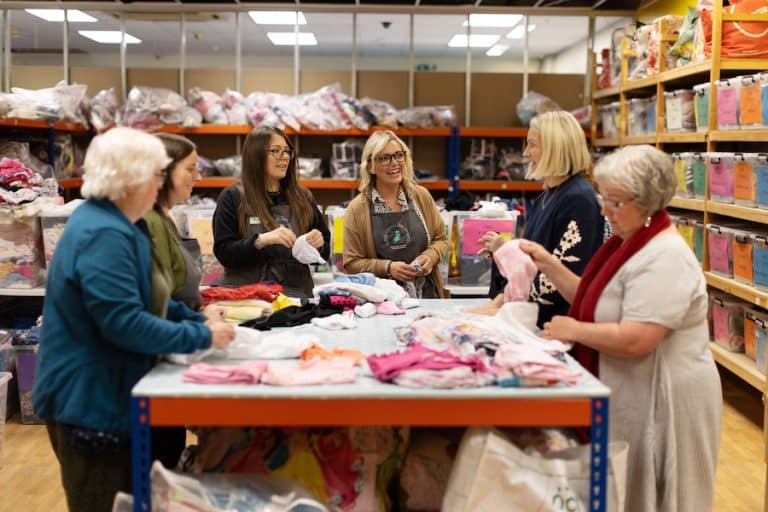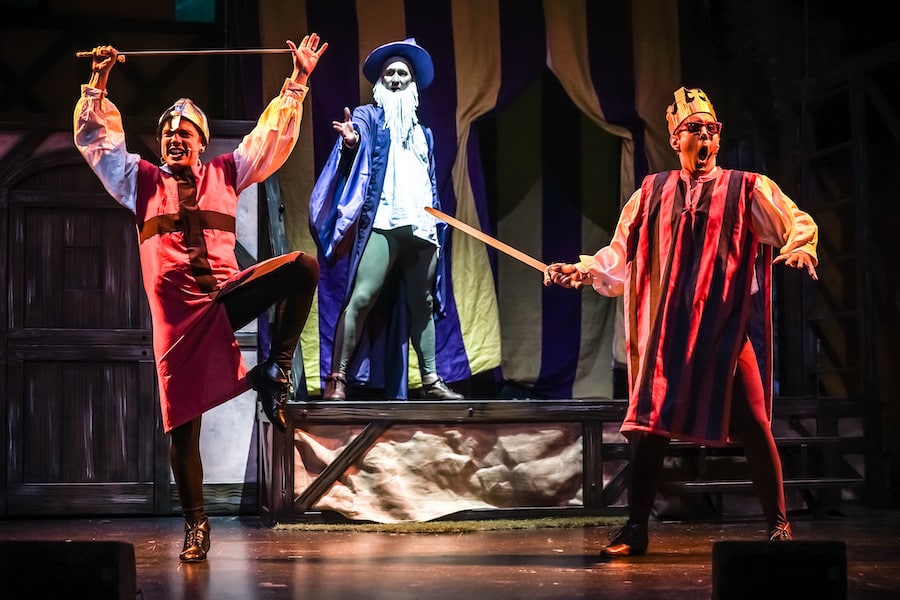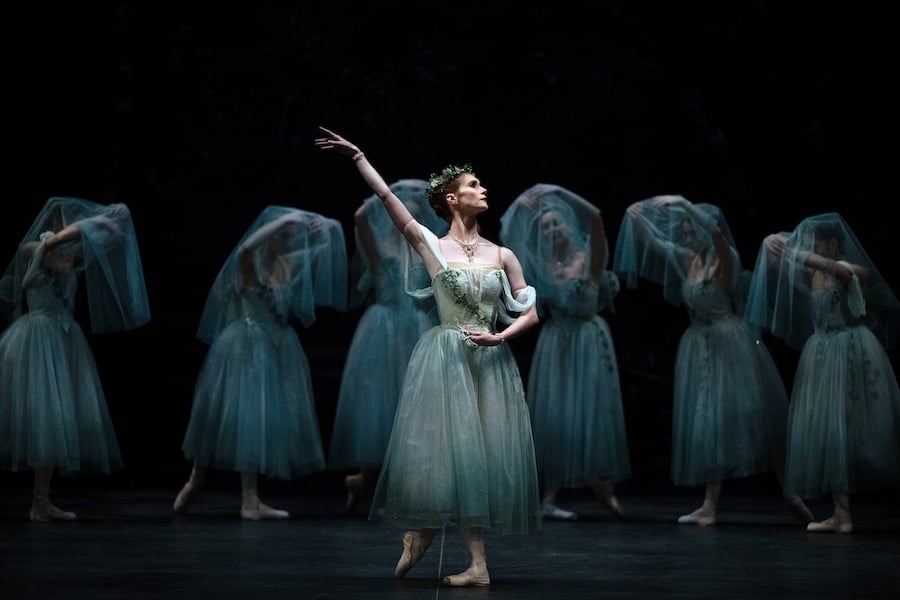Kacey Ainsworth shares journey from improvising with Mike Leigh to working on Leaves of Glass
- Written by Glenn Meads
- Last updated 2 years ago
- Theatre
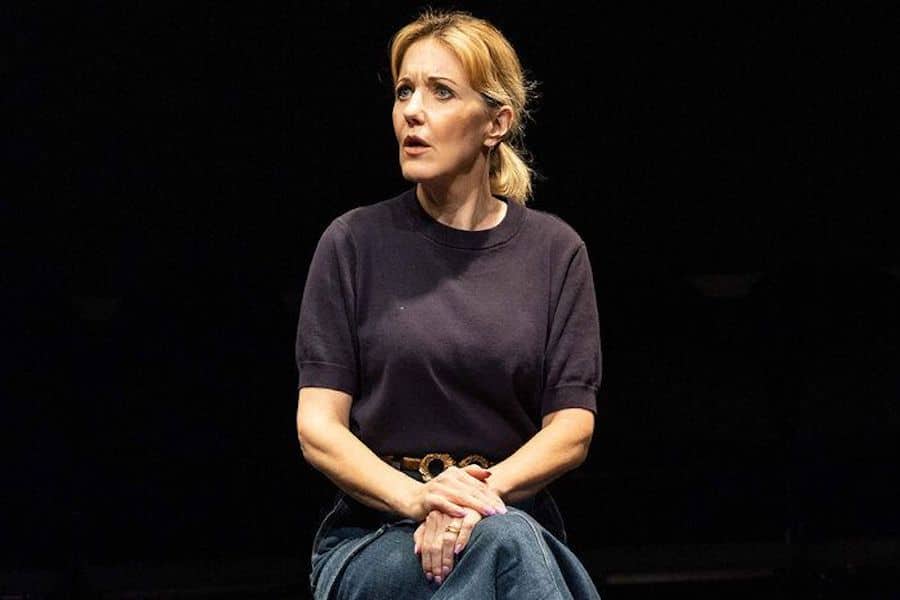
Kacey Ainsworth is a working-class actress, known for playing strong women.
Her latest role is back on the stage in Phillip Ridley’s Leaves of Glass and she relishes performing in the round and likens it to being in ‘whirlpool’ as the actors walk around the stage, landing in different places each night.
Kacey has worked with Mike Leigh in the hit film Topsy Turvy and she really enjoyed the improvisation, that many associates with this Salford-born writer and director’s work.
It was improv that saw her arrive in Albert Square as the iconic character Little Mo Slater, alongside a group of incredibly strong women that made up her screen family.
Speaking of strong women, Kacey also played Mrs Lovett in Stephen Sondheim’s Sweeney Todd at the Everyman Theatre in Liverpool and she gave her own spin on this deeply misunderstood character.
We caught up with Kacey to find out how she got into acting, the life of a working-class actress and the challenges you face, life after Eastenders, performing in the round and why she loves starring in Leaves of Glass.
How did you get into acting?
A lot of it was by chance. I went to a local audition and I went there because it was around the corner from my dad’s office. I did not really know what I was doing and it was in half term. It was really by chance that I got into the business.
How difficult is it for a working-class actor to survive in this profession, if they have no disposable income or no one to fall back on?
The audition fees are without reach for some and living in London was really expensive. And I found it was a very different experience for me than for other people who had support.
I also found most of the people I met at drama school had independent means, whereas I worked all the way through because I had to support myself. Grants don’t exist anymore, they have been replaced by student loans. So some people of my background are unable to train – which is really important because if you want decent connections with the business you have to go to a really decent drama school, in order for the agents to pick you up.
What about after drama school?
After that, you have to bide your time in-between jobs and unless you have a trust fund, it’s very difficult to say ‘I won’t do that little part in Casualty – I’ll wait around for something else.’ You don’t have the means by which to support yourself. If you try and get job seeker’s allowance, they will say to you ‘You can’t be an actor, you have got to work somewhere else.’ It’s really expensive and that’s why this industry is full of people who have independent means. People without financial means need the most help and support after they leave drama school.
Is there a teacher who has inspired you or inspired you?
I have got people like that. Mainly the ones who said you do not have to change yourself, that I did not have to have a degree, I did not have to go to Cambridge. What I could bring to the table was good enough and that the talents I possessed – I could be the first ‘me.’
And what about in the profession?
I get inspired by literally everyone I work with. That can be kids that I work with. It’s a lovely experience to work with people who love it. It is so precarious and you have to have a thick skin and you have to love it. I have friends who have got kids who are graduates and they tell me how difficult the interview techniques are now. They talk about the hoops their kids have to jump through and then not get the job. I think to myself, that’s my whole life. Part of your job is the bit in-between, how you manage your time in-between the jobs. And other people’s expectations of what you do in-between jobs.
You get people coming up to you saying ‘you would be really good in Downton’ or ‘you would be great in Star Wars’, like you can just pick the phone up and say “I wanna audition for this.” (laughs) You have to have huge amounts of resilience and that’s something that definitely needs to be taught in drama school.
What advice would you give a young actor with a gap from one job to the next?
Doing voice exercises costs nothing, doing voice exercises costs nothing. Read as much as you can and see as much as you can. Because you could get a call asking you to make a decision about a job within 24 hours, so you need to be ready for that. But it is difficult.
How did you get the part in Philip Ridley’s Leaves of Glass which arrives at the Hope Mill next month?
I had a phone call and I was out to lunch with my cousin. My agent said ‘you need to go and a read script now. And I need an answer within an hour.’ You realise that someone has dropped out, cannot do it or has been fired so you literally drop everything. I left my cousin at dinner eating by himself. I went off and read the play. I got 10 pages I and thought I really love it. I thought I am gonna say yes to this, which I did. And the next day I was in rehearsal.
What was it that grabbed you about the play from the word go?
Well, obviously I have been around for quite a while and I have read a lot of scripts. If it is difficult to get through you realise it’s not very good or it needs some revisions. With this one, I understood the language. And because of some of the stuff I have done in the past, I understood the set up and the mechanisms. It is naturalist and it’s not because it is heightened naturalism. There are a lot of technical things in there where people are taking over one another. And I have done plays like that before. But it was the writing. Phillip Ridley’s writing is visceral, it goes to the heart of the matter straight away. Immediately when I read it I thought’ I know what this is.’ It’s always in the writing.
Phillip Ridley is a master of the ‘unsaid’, as well as the dialogue itself. Was that an exciting challenge for you?
It is……because when you break it down, it’s so damn clever the way the little threads are placed. It’s delicate – the writing but it also hammers you over the head. It’s this amazing concoction of being really strong and wonderfully soft. So you are drawn in and it’s like a whirlpool. You are drawn into the centre of this piece by what all of these actors are saying and doing and also not doing and not saying. It’s wonderfully clever and if people don’t know Phillip Ridley’s writing, go and see anything of his because are usually wonderful intense experiences that you won’t see anywhere else. I do misery well but I also enjoy the lighter moments. You get to do them all in Phillip’s plays. There is lightness in sadness. It’s why people laugh at funerals because even at the worst of times there is something that might make you laugh and in the best of times, there is something that will make you cry. And that’s what he hones together; those two wonderful extremes.
Park Theatre (where Leaves of Glass opened) and the Hope Mill Theatre are very intimate spaces compared with the big theatres. Is that scary or exciting for an actor?
It much more pressure in an intimate space. In a bigger space, there is an ability to ‘lock yourself’ behind that ‘wall.’ There is a different stagecraft here as well, as you play the back of the gallery when you are in a big space. So it’s a different kind of thing. I really love working in the round. Hope Mill are presenting this in round, when I was in Sweeney Todd at the Everyman, it was in the round.
I think it creates a completely unique audience environment where everybody gets a piece of everything. In this production that’s exactly what you are getting. We kind of swirl around the stage because we are in the round. It is much more terrifying doing a piece like this than being in a big space. You feel very actor-y when you are on a literal stage. You feel like you are playing for ‘them’, you are out there for ‘them.’ Whereas, when it’s an intimate space, it’s all of ‘us’ in it . We’re all in the play, we’re all doing the play. You’re seeing everything, you’re seeing the whites of our eyes, trembling fingers. We’re seeing you shifting about in your seat or not shifting about in your seat. We’re hearing your audible gasps. We’re hearing you say: “Oh No!” and that’s what we get with Leaves of Glass. We get people visibly and audibly saying things about the show and we do hear that. And it’s wonderful. I feel the audience is part of the show and you are getting something different each night. Our director does not block so it is completely different as we sit somewhere different every night. Other than the fight sequences, everything is completely new. It is a complete experience for all of us.
Is that freeing for an actor?
For me it was quite hard, as I only had a week to rehearse. I have to do it or stand in a certain place to know what I am doing, as I am a kinetic learner. For me, I did not have that crutch of knowing what I was doing. The long run, you may play it night after night but you can hit the marks or thereabouts. We have to be present every night. There are not a lot of props so it’s all very stark. You have to connect with each other because there is nothing else. And it is freeing.
Little Mo in Eastenders is a beloved character. How did the part change your life?
It was a real departure for me. I had never had any thoughts about doing Eastenders or wanting to do a soap or even being in a soap. I had just finished Mike Leigh’s Topsy Turvy so I was on a different kind of trajectory as an actress. And I went to these big workshops for Eastenders and I realised I had probably been a bit snobby about Eastenders and soaps in general. I had always loved Corrie and I think it’s because it was a bit removed. And there was this idea if you were a Southern working-class actress, Eastenders was the only place you were going to work. So I had a real sense of not doing what I was expected to do. When I went to the auditioned, I realised they were planning something special. And when I met the girls playing the Slaters in the workshops, there was something really special from the improvisations that we did together. I had been doing a lot of improv with Mike Leigh and we were found through improvisation. I could feel that this was going to be something special. They weren’t doing what every other soap was doing that the time; two bruvvers, two bruvver and two bruvvers; both bald. Both hard men. There were putting in a group of women. They decided to put in a family of women at a time when we were told women won’t buy records by a group of women. Along came the Spice Girls. It changed my life because people knew who I was. It also meant people just saw me as that character.
Do you feel it encouraged us to have conversations about domestic violence?
It did get us talking about domestic violence and I also think it started to get us talking about coercive control in relationships. And I think that was the most important thing about Mo and Trevor’s relationship was showing how much he isolated her and how much he controlled her. And how he got her away from her family and all of those things and I think that, for me was people understanding why people stayed in domestic violence situations. Why they didn’t leave, why they stayed was the most important thing. A lot of the time people are conditioned to think they can’t do any better. People understood not just the physical violence, but the emotional violence too, and that gradual drip, drip effect of control.
You mentioned earlier that you played Mrs Lovett in Sweeney Todd at the Everyman in Liverpool. What are your memories of that production, as it was very different to what we are used to with this show?
It was incredible, it was a brilliant experience. Nick Bagnall the director was so fantastic about how we were going to put this on. I love working in an ensemble and we had a beautiful ensemble piece. I hate audience participation with a passion but we didn’t ask the audience to do anything. We just wanted them to enjoy it, along with us. Nick allowed me to put my own stamp on Mrs Lovett. She is normally played like a seaside landlady and a figure of fun. I wanted to turn that on it’s head and not play her like that. She is desperate, she’s for no money, she’s got nothing. She is absolutely desperate and she is on her arse. She needed to do whatever she could to survive. And there are people out there now having that same situation. They are deciding whether to put the heating on or whether to have dinner. They are deciding whether o wash their clothes or watch the television (because it’s all electricity) or have a cup of tea. I wanted her to appeal to everybody who is in a situation where it is bloody hard to live. I didn’t want her to be a figure of fun who wore a cloth cap; just some mad old bint. I didn’t want it to be that. I wanted her to have real strength and power and she is the catalyst for everything. She puts people in pies because she’s got no other option. People steal and lie and do stuff like that because they’ve got no other option. The designer came in with an old grey cardigan and I said: ‘Noooo, she’s got bleached blonde hair, she’s got ripped jeans. She’s out there doing whatever she can to earn a crust.’
Lastly, why should audiences leave the house, turn off the TV and come and see Leaves of Glass?
I would say It’s live. And in live theatre, anything can happen and it’s different every night. And this is not a play that manipulates people into thinking one thing or another. The play allows you to make that up for yourself. We’re so used to dramas that lead you to the next place and the one after. And reality shows that decide the winner at the beginning and then edit the show to make that happen. Then at the end, we are all very happy as we chose the winner. This play doesn’t do that. You have to make up your own mind. That’s what makes it different.
You will come of the theatre and you will be talking about it. We were sold out at Park Theatre and people are coming out. They are doing that because this is affordable theatre. Most theatre isn’t affordable these days. You will see three young actors who you will see in this industry. They are being given an opportunity to play lead roles and they are smashing it. It’s wonderful to see young people from my industry in a play like this and getting huge plaudits for it.
Leaves of Glass is at the Hope Mill Theatre from 3rd – 8th July and tickets can be booked here.
- This article was last updated 2 years ago.
- It was first published on 20 June 2023 and is subject to be updated from time to time. Please refresh or return to see the latest version.
Did we miss something? Let us know: [email protected]
Want to be the first to receive all the latest news stories, what’s on and events from the heart of Manchester? Sign up here.
Manchester is a successful city, but many people suffer. I Love Manchester helps raise awareness and funds to help improve the lives and prospects of people across Greater Manchester – and we can’t do it without your help. So please support us with what you can so we can continue to spread the love. Thank you in advance!
An email you’ll love. Subscribe to our newsletter to get the latest news stories delivered direct to your inbox.
Got a story worth sharing?
What’s the story? We are all ears when it comes to positive news and inspiring stories. You can send story ideas to [email protected]
While we can’t guarantee to publish everything, we will always consider any enquiry or idea that promotes:
- Independent new openings
- Human interest
- Not-for-profit organisations
- Community Interest Companies (CiCs) and projects
- Charities and charitable initiatives
- Affordability and offers saving people over 20%
For anything else, don’t hesitate to get in touch with us about advertorials (from £350+VAT) and advertising opportunities: [email protected]
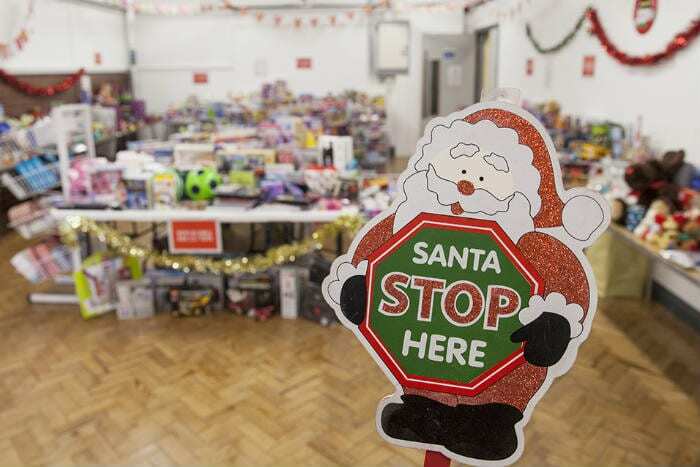
The very special toy shop where parents don’t pay a penny is open – and busier than ever
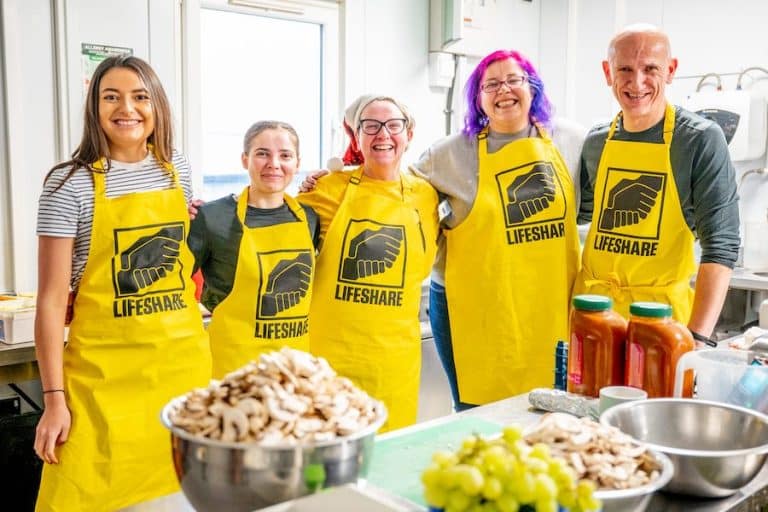
Manchester’s oldest homelessness charity celebrates 40 years of supporting the needy
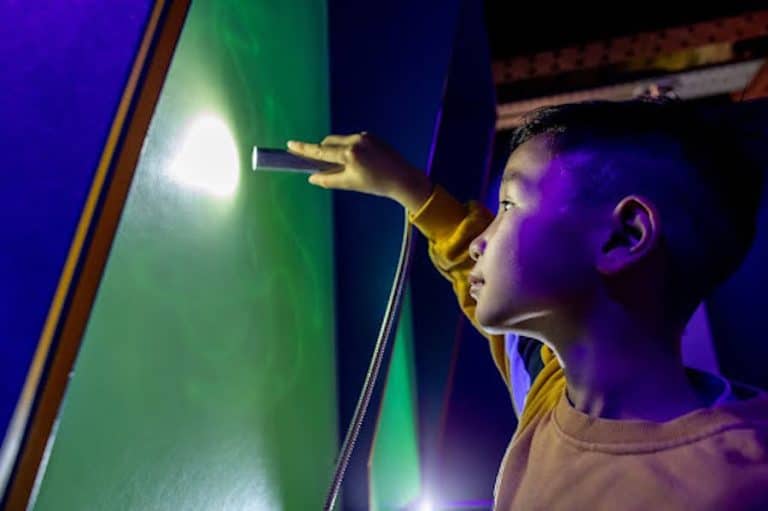
Games, science and history collide at Manchester’s Science and Industry Museum this winter

Best bars and pubs to watch the football and live sport in Manchester

How Baguley Hall Primary School is nourishing minds with a morning Magic Breakfast
